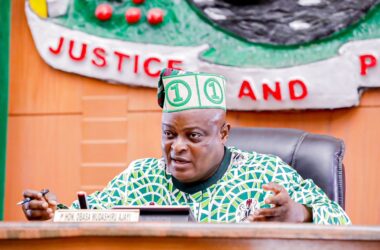The Nigerian Senate has successfully passed the tax reform bills for a second reading, as presented by President Bola Tinubu in October 2024. The passage of the bills followed a detailed debate among senators on the proposed changes to the country’s tax system.
After the debate, the bills were referred to the Senate Committee on Finance, which has been tasked with reviewing them and submitting a report within the next six weeks.
Prior to the debate, lawmakers held a closed-door session for about an hour. Upon returning, Senate Leader Opeyemi Bamidele (APC, Ekiti Central) led the discussion on the bills, outlining their significance for Nigeria’s economic future.
The four bills under consideration are the Nigeria Tax Bill 2024, which will set the framework for taxation in the country, and the Tax Administration Bill, designed to provide a legal structure for all taxes and reduce disputes.
The third bill, the Nigeria Revenue Service Establishment Bill, will replace the Federal Inland Revenue Service Act and establish the Nigeria Revenue Service. The fourth bill, the Joint Revenue Board Establishment Bill, aims to set up a tax tribunal and an ombudsman for tax issues.
Bamidele emphasized that these reforms are crucial for simplifying the tax system, easing the burden on small businesses, and improving tax collection processes.
He explained, “The Nigerian tax reforms bill is a significant move to overhaul the country’s tax system. These bills aim to simplify the tax landscape, reduce the burden on small businesses, and streamline how taxes are collected.
“In broad terms, the four bills seek to ensure uniformity in tax revenue administration in Nigeria in accordance with the provisions of the Constitution, eliminate the incidence of double taxation across the country, deploy taxation as a tool to encourage private sector investments in critical industries and boost individual disposal incomes through targeted tax exemptions as captured in the various Bills.
“In the area of tax exemptions, there is a proposal to exempt those whose salaries are not more than the minimum wage from P.A.YE deductions while small businesses with an annual turnover of N50,000,000 or less are equally exempted from payment of taxes. Similarly, there is a proposed huge reduction in company income tax from the current 30% to 25% by 2026, as part of a deliberate attempt to curtail the incidence of double taxation and multiplicity of taxes and levies.”
Senators such as Sani Musa (APC, Niger East), Seriake Dickson (PDP, Bayelsa West), and Tahir Mongunu (APC, Borno North) supported the bills, expressing their approval for the reforms.
However, Senator Ali Ndume (APC, Borno South) raised concerns about the timing of the bills and issues related to derivation and value-added tax (VAT). He suggested that the bills be delayed for further consultation.
When Senate President Godswill Akpabio called for a voice vote, the majority of lawmakers voted in favor, signaling their support for the bills. Akpabio confirmed the passage of the bills, which was met with a resounding “Aye” from the chamber.










